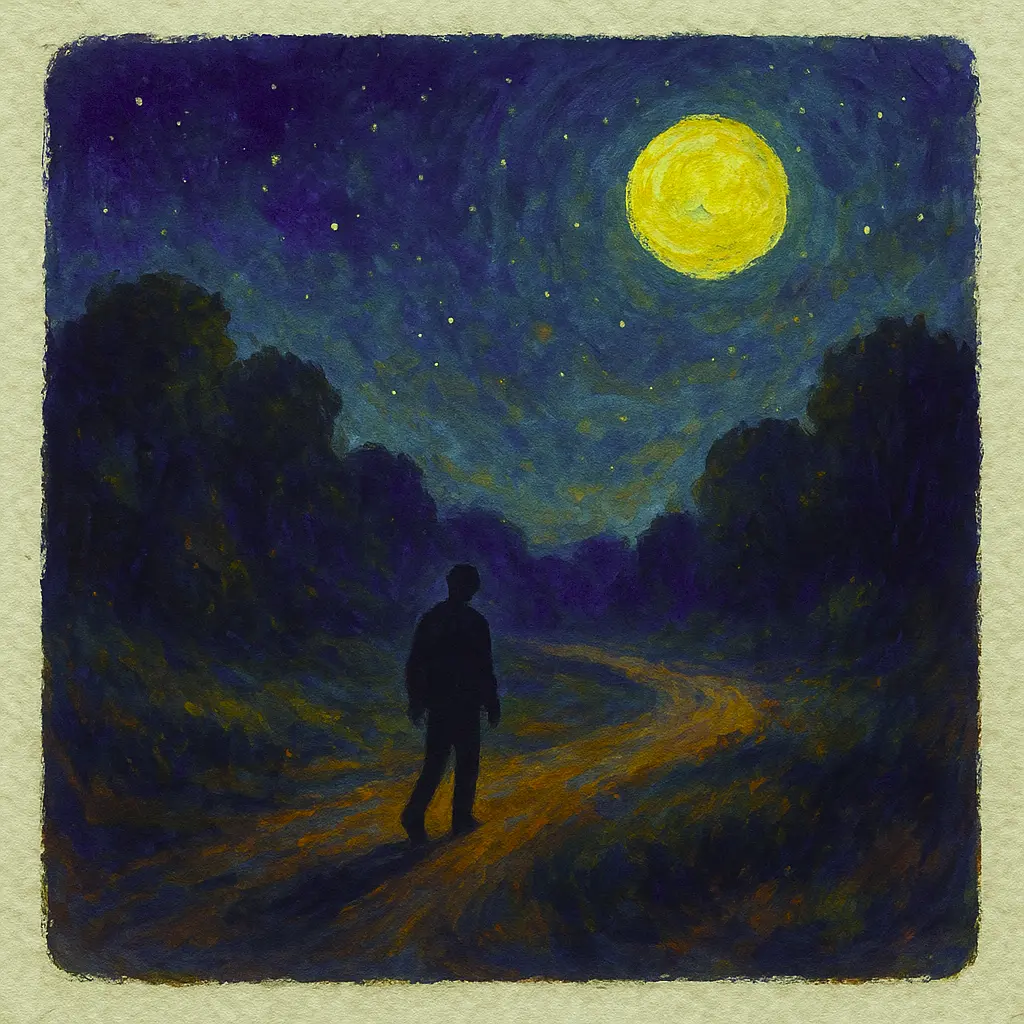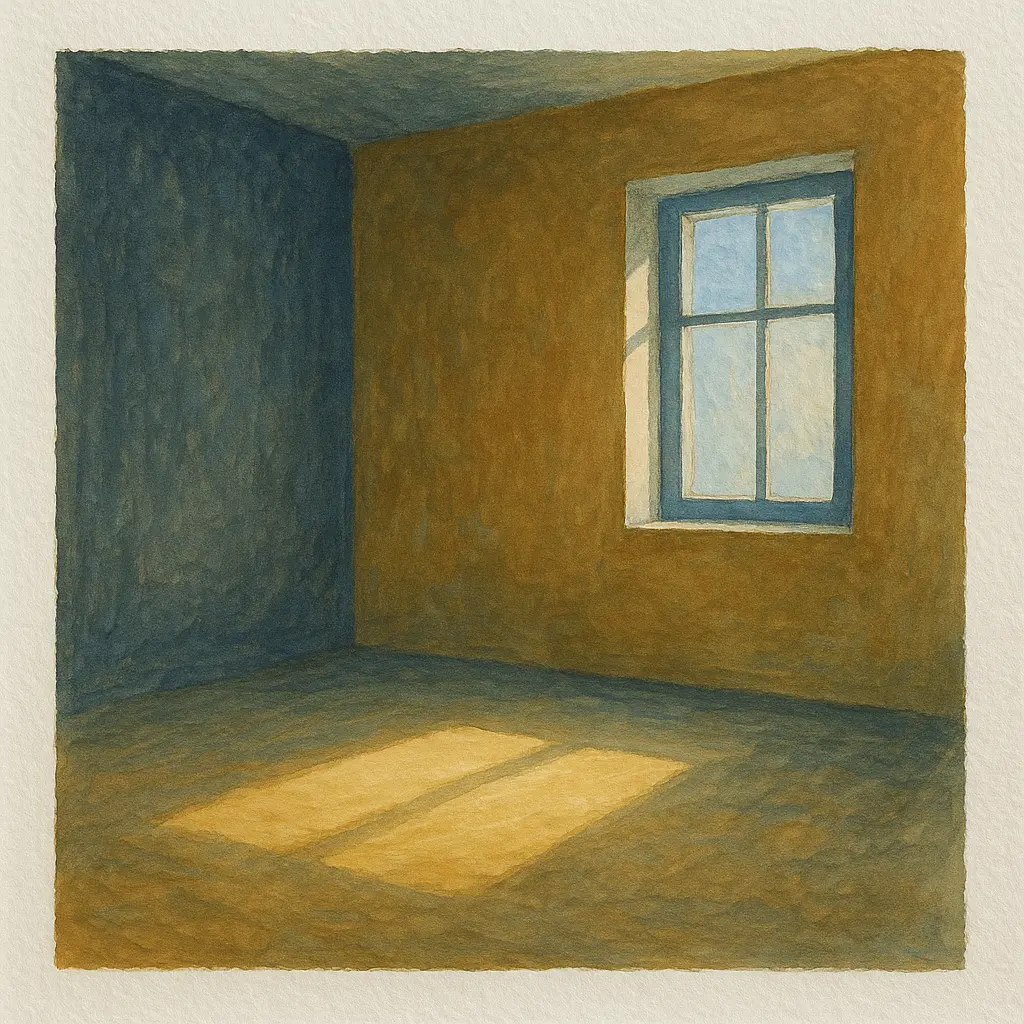Night carries a special quality. It condenses what is scattered during the day. A single breath, barely audible, becomes an event. A foreign scent, impossible to place, turns into a riddle. I walk home, leaving the bus stop behind, only a few steps from our house. A distant sound of brakes, almost swallowed by the dark, reminds me that others are out as well. And yet, at the center of this silence stands a question that refuses to be dismissed: Is this my last path?
The question may sound dramatic, but it is sober. Any path can be the last. Not because of metaphysical speculation, but simply because life is fragile. Statistically, every breath embodies an improbable sequence of biological conditions: oxygen intake, heartbeat, neuronal activity. If any of these falters, the process ends. The end is the end.
1. Transience as a Scientific Fact
Biology describes the end unambiguously: when the heart stops beating, oxygen supply to the brain ceases, and neuronal activity collapses, consciousness dissolves. Neuroscientific studies of dying show brief aftershocks of electrical activity, a short flare of neuronal patterns – but these are not consciousness in the lived sense. They are discharges, not experience.
This is where science diverges from religious traditions that believe in survival beyond death. Buddhism takes a middle course: it speaks of impermanence (Anicca) and non-self (Anatta). It is not the “I” that continues, but conditions, effects, traces. And here, science and Buddhism meet in a subtle way: we do leave traces – not metaphysical ones, but social, cultural, psychological.
2. Traces in Others – The Continuation of the Finite
When I go, nothing biological of me remains. But others carry something I have placed in them. Psychologists call them implicit memory traces. Every encounter shapes neural connections, alters associations, attitudes, expectations. Words we speak may return years later as inner voices. Gestures may plant trust or distrust.
Neurologically, even small actions shape synapses. They literally leave a mark in another person’s brain. In social terms: we bear responsibility, because our actions do not stop with us. They carry on, even when we are long silent.
In Buddhist vocabulary, one might call this “karma” – not as a mystical ledger, but as chains of effects. Those who sow unrest leave unrest. Those who offer understanding leave understanding.
3. Noise and the Matrix
Why do we forget this so easily? Because we live in noise. Distraction becomes the rule, quiet the exception. We chase images, schedules, digital messages, one goal after another. In the process, we overlook what matters: our actions leave traces.
The metaphor of the “matrix” can be fruitful if stripped of myth. The matrix is not a computer network, but the mesh of our own habits. Psychologists would speak of automated behavior scripts, Buddhists of Samsara. It is the unconscious running along in patterns we no longer question.
Breaking out does not mean leaving the world behind, but seeing through our own patterns. Neurologically: using the brain’s plasticity to form new pathways. Philosophically: pausing in silence and taking one’s breath not as a side note, but as reality.
4. An End Without Consolation – and Yet With Responsibility
“Ashes to ashes, dust to dust.” The phrase condenses what biology confirms: organisms dissolve, matter returns to cycles. While religions point to an afterlife, science insists on honesty: the end is the end. Consciousness does not persist.
But here begins responsibility. For what does finality mean? It makes our actions in the time we have all the weightier. Everything we do happens once, never in the same way again. Every look, every word, every act of care or harm imprints itself on others – and thereby on the world.
The good we pass on resonates. It does not live as a spirit-being but as altered thought, feeling, and action in those we touched. One could poetically call them “good spirits” – not because they float metaphysically, but because they continue as fields of resonance in those we influenced.
5. Rethinking as the Smallest Movement
The night shows how little is needed to understand this. Breath. Steps. A scent without a name. Often that is enough to ask: what remains of me?
Rethinking need not be a grand program. It is the smallest movement: letting go. Letting go of noise, of fear of the end, of fixation on one’s own importance. Then silence is not threatening but sustaining.
And right there, responsibility arises – not for a metaphysical beyond, but for the concrete world we touch. For the person beside us, the animal crossing our path, the thought that lingers in another’s mind.
6. The Good We Give
The end is inescapable. Biological, unstoppable, irreversible. But finality is not a deficit; it is the greatest invitation. It calls us to act while there is time.
The good we give carries forward – not as a soul, but as a trace that multiplies. The harmful does as well. In this lies responsibility, and perhaps also solace: not because we ourselves endure, but because we alter the world in those we leave behind.
The night is quiet. But it says precisely this: act while you breathe. For afterwards, there is only silence.


